Upchurch
and North Kent (Roman) Pottery
A ceramic typology for northern
Kent, first to third centuries A.D. By Jason Monaghan
Back
to Pictures of Fabrics Introduction
Pictures
of Fabrics with no added temper - Page
252
N1/1
- N – no added temper, 1 - variation, /
1 - Upchurch, including Hoo and all Medway marshes
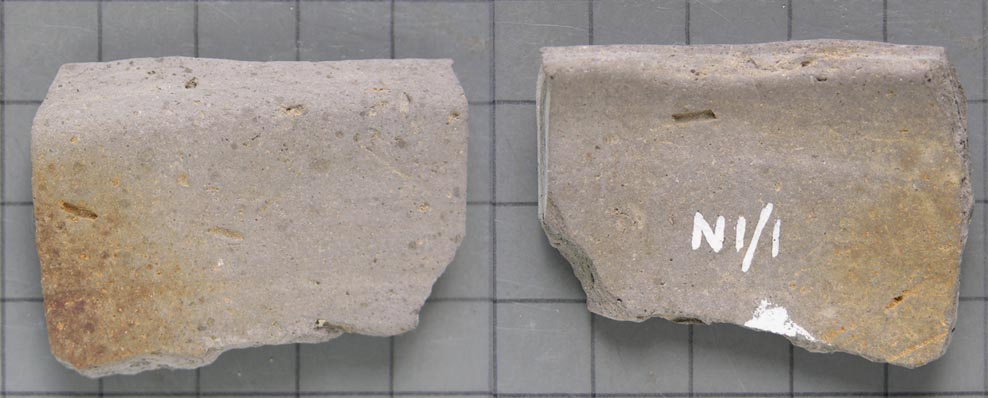
(Background grid to pictures in cm
squares)
Picture
still to be added here
Picture of fabric of sherd of no added
Tempered pictured above
(scale in millimetres)
N1/1b
- N – no added temper, 1 - variation, /
1 - Upchurch, including Hoo etc marshes, b - burnished
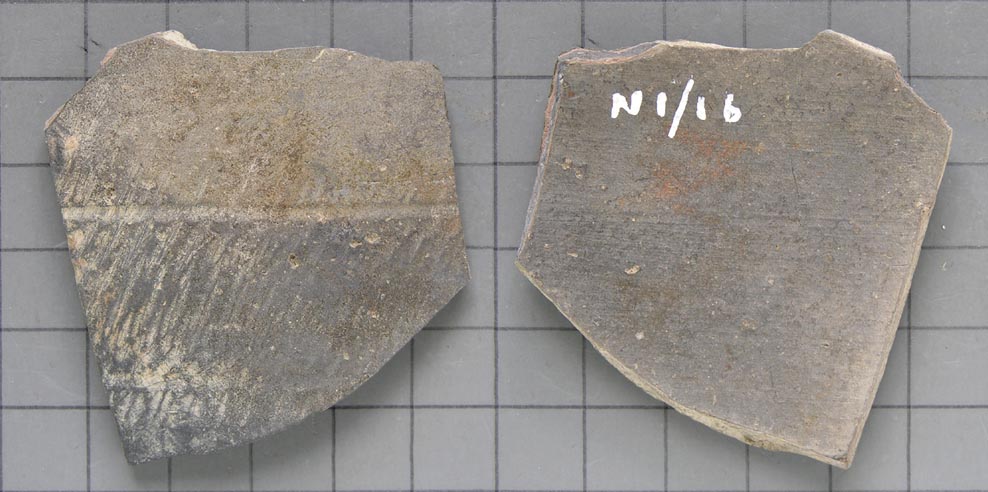
(Background grid to pictures in cm
squares)
Picture
still to be added here
Picture of fabric of sherd of no added
Tempered pictured above
(scale in millimetres)
N2/1b
- N – no added temper, 2 - variation, /
1 - Upchurch, including Hoo etc, b - burnished
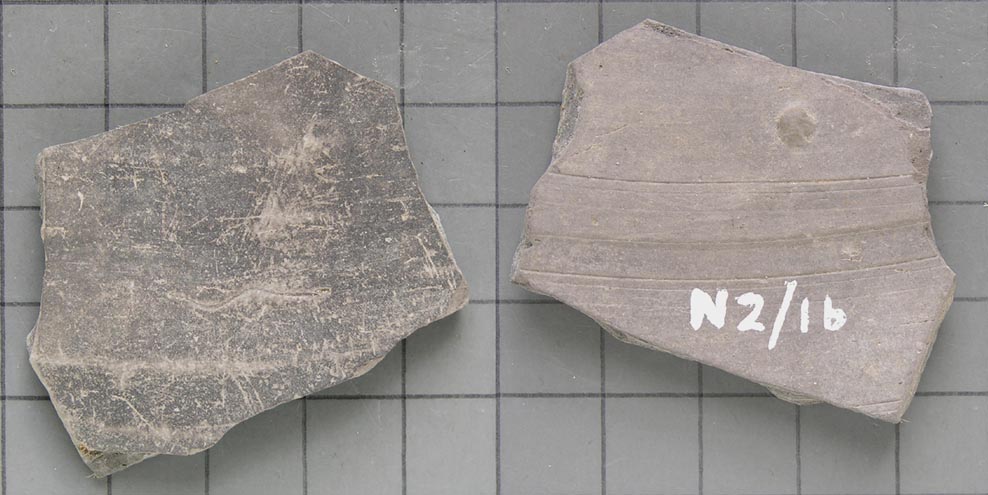
(Background grid to pictures in cm
squares)
Picture
still to be added here
Picture of fabric of sherd of no added
Tempered pictured above
(scale in millimetres)
N2/4b
- N – no added temper, 2 - variation, /
4 - Cliffe parish
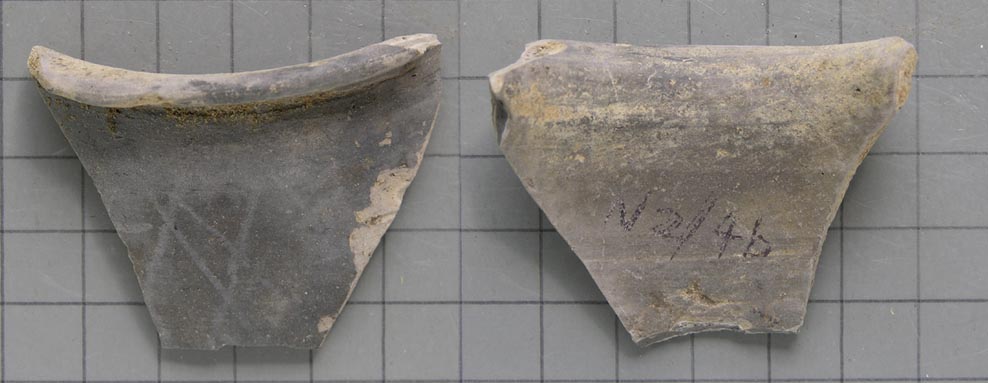
(Background grid to pictures in cm
squares)
Picture
still to be added here
Picture of fabric of sherd of no added
Tempered pictured above
(scale in millimetres)
N3/1
- N – no added temper, 3 - variation, /
1 - Upchurch, including Hoo etc marshes, mica-dusted

(Background grid to pictures in cm
squares)
Picture
still to be added here
Picture of fabric of sherd of no added
Tempered pictured above
(scale in millimetres)
N4/1s
- N – no added temper, 4 - variation, /
1 - Upchurch, including Hoo etc marshes, S - sand
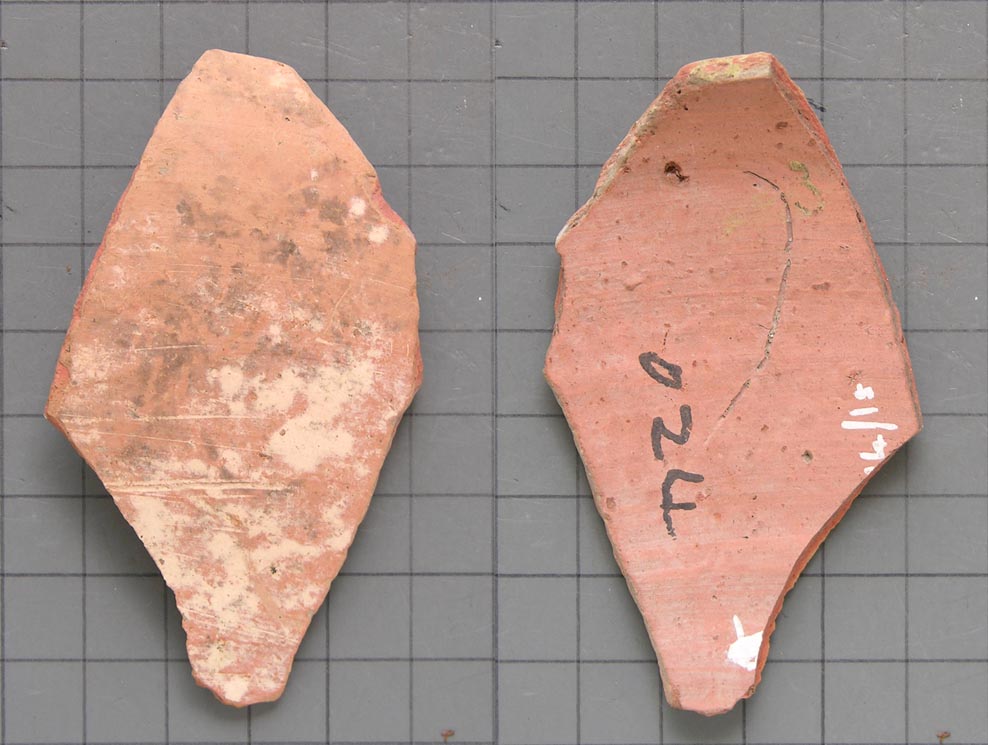
(Background grid to pictures in cm
squares)
Picture
still to be added here
Picture of fabric of sherd of no added
Tempered pictured above
(scale in millimetres)
N4/1s
- N – no added temper, 4 - variation, /
1 - Upchurch, including Hoo etc marshes, S - sand
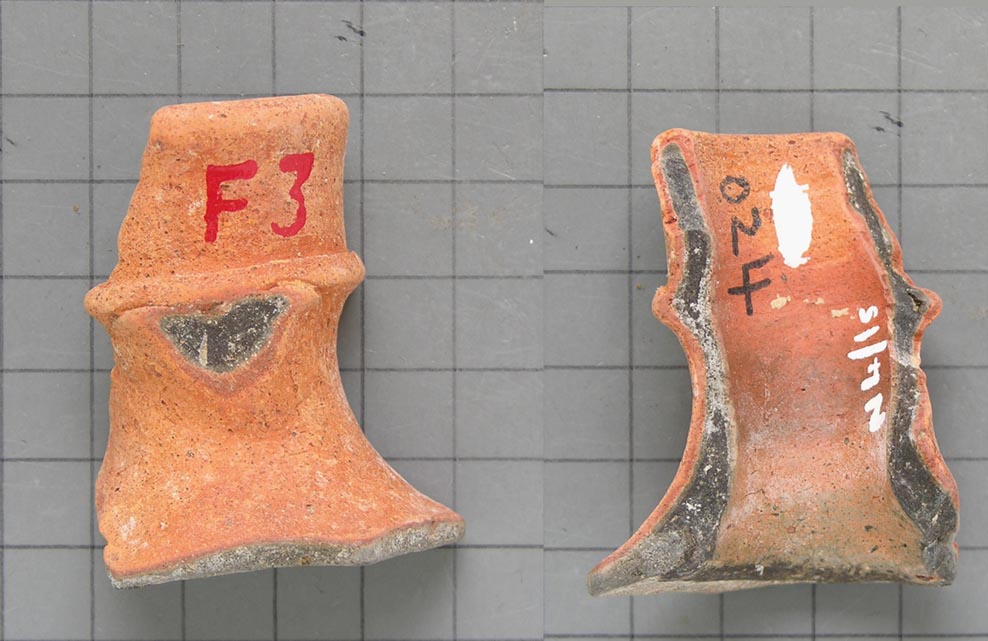
(Background grid to pictures in cm
squares)
Picture
still to be added here
Picture of fabric of sherd of no added
Tempered pictured above
(scale in millimetres)
N1/1b
Colour
: black to light grey, occasionally pale orange-pink.
Section : as surface, or
sandwiched light and dark grey.
Texture : soapy. Hardness :
soft, Fracture : clean.
Surface : burnished smooth.
Becomes blotched when eroded.
Decoration : rouletting, 'barbotine' dots, incised lines,
compass scribing, cordons, burnishing in zones.
Manufacture : wheel thrown and turned.
Inclusions : Magnetite, sparse to moderate,
medium, i, SA.
Voids, sparse to moderate, fine, i, R.
Quartz, occasional, very fine, w, SA.
Grog, occasional, medium, i, A.
Chalk, occasional, fine, i, SA.
Shell, occasional, fine, i, A.
Variations :
N1/1bs: As above, but slipped an upper parts before burnishing. Slip
may be same colour as vessel, often black, occasionally white.
N2/1b
Colour : black
to dark grey, occasionally pale orange-pink.
Section : grey or black core
with pink or grey margins.
Texture : smooth. Hardness :
fairly hard. Fracture : fine irregular.
Surface : burnished, often to a
very high gloss.
Decoration : rouletting, 'barbotine' dots, incised lines,
compass scribing, cordons, burnishing in zones.
Manufacture : wheel thrown and turned.
Inclusions : Quartz, sparse to moderate, fine,
w, SA.
Voids, sparse, fine, i, R.
Mica, occasional, very fine, i, F.
Shell, occasional, fine, i, F.
Chalk, occasional, fine, i, R.
Note :
N2 was made from a siltier clay with a lower iron content than was
used for Nl. It can be distinguished from HI because of the latter's
blotched appearance.
Variations :
N2/1bs: As above, but slipped black or grey.
N2/4b: As above but colour is black or steel grey. In section it is
grey or black but seldom sandwiched, decoration is limited to
rouletting, cordons and grooves. The fabric is only postulated and may
be a version of Upchurch N2/1.
N3/1bs
Colour : light grey to buff-yellow.
Section : as surface or with black core and black
interior face. Texture: soapy. Hardness: soft. Fracture: clean.
Surface : slipped grey or white, mica
prominent.
Decoration : rouletting, incised grooves, compass-scribing.
Manufacture : wheel thrown and turned.
Inclusions : Quartz, sparse to moderate, fine, w, SA.
Mica, sparse, fine, w, F.
Magnetite, sparse, medium, i, SA.
Voids, sparse, fine, i, R.
Grog, occasional, fine, i, SA.
Note:
Mica sheen is not a true mica dust, colour is main distinguishing
feature.
N4/1s
Colour :
orange-pink.
Section : as surface or has
a black core and black interior face. Texture : soapy. Hardness :
soft.
Fracture : clean.
Surface : slipped white.
Decoration : normally none. Odd forms may be rouletted.
Manufacture : wheel made, in 3 parts if flagon, and turned. Inclusions
:
Magnetite, sparse to moderate, medium, i, SA.
Quartz, sparse, very fine, w, SA.
Mica, sparse, very fine, w, F.
Voids, sparse, fine, i, R.
Grog, occasional, medium, i, A.
N5/6h
This 'fabric' is typical of a range of handmade, untempered fabrics
probably employed in an ad hoc manner on home-made pots. The
inclusions vary depending on the exact location of manufacture but may
consist of quartz, grog, charcoal, flint, greensand, mica, chalk,
shell, magnetite, ironstone and gravel in varying quantities. The
resultant fabric is usually soft and soapy and the colour may vary as
much as the inclusions.
Fabric definitions
- Fabrics are listed according to
temper. Where fabrics from different production sites are very
similar, only the most typical is described in full. The remainder are
listed in numerical order. Only Upchurch and Thameside fabrics are
described, those of Thameside Essex and West Kent being beyond the
scope of this work. The philosophy of the chosen system is outlined in
chapter 4.
Temper Codes C - chaff, F - flint,
G - grog, H - shell, I - no temper,
S - sand
Production Area
1 - Upchurch, including Hoo and all Medway marshes. 2
-Isle of Grain.
Codes 3
- Higham and the High ground above the Thames.
4 -Cliffe parish.
5 - Shorne parish and marshes to the east of Chalk.
6 -Cooling and Halstow marshes.
Technical Variations b - burnished.
h -hand made body (rim may be wheel finished),
p -pitch-painted, s -slipped.
Back
to Pictures of Fabrics Introduction
For details about the advantages of membership of the Kent
Archaeological Society click
here






